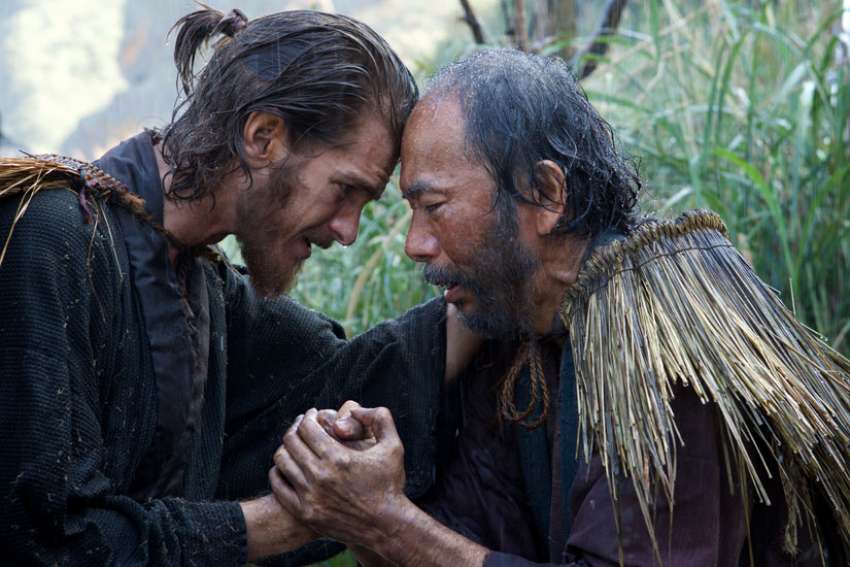His most recent offering, the much-anticipated Silence, based upon the Shusaku Endo novel, is a worthy addition to the Scorsese oeuvre.
The story is set in mid-17th century Japan, where a fierce persecution of the Catholic faith is underway. To this dangerous country come two young Jesuit priests, sent to find Fr. Ferreira, their mentor and seminary professor who, rumour has it, had apostatized under torture and actually gone over to the other side.
Upon arriving they are met by a small group of Japanese Christians who had been maintaining their faith underground. Eventually, the authorities get wind of their presence and suspected Christians are rounded up and tortured in the hopes of luring the priests out into the open.
In time, the priests are captured and subjected to a terrible form of psychological torture. The film focuses on the struggles of Fr. Rodrigues. As Japanese Christians are tortured in his presence, he is invited to renounce his faith and end their torment. He refuses.
Even when a Japanese Christian is beheaded, he doesn’t give in. Finally, and it is the most devastating scene in the movie, he is brought to Fr. Ferreira, the mentor whom he had been seeking since his arrival in Japan. All the rumours are true: this Jesuit hero has renounced his faith, taken a Japanese wife and is living as a sort of philosopher under state protection. The disgraced priest tries to convince his former student to give up the quest to evangelize Japan.
The next day, in the presence of Christians being horrifically tortured, he is given the opportunity to step on a depiction of the face of Christ. At the height of his anguish, Rodrigues hears what he takes to be the voice of Jesus Himself telling him to trample on the image. When he does so, a cock crows in the distance.
He then follows in the footsteps of Ferreira, becoming a ward of the state, a well-fed, well-provided for philosopher. He takes a Japanese name and a Japanese wife and lives out many long years before his death at age 64.
What do we make of this strange and disturbing story? Like any great film or novel, Silence obviously resists a univocal or one-sided interpretation. Almost all of the commentaries I have read, especially from religious people, emphasize how Silence beautifully brings forward the complex, layered, ambiguous nature of faith. Fully acknowledging the truth of that claim, I would like to propose a comparison, altogether warranted by the instincts of a one-time soldier named Ignatius of Loyola, who founded the Jesuit order.
Suppose a small team of special ops soldiers was smuggled behind enemy lines for a dangerous mission. Suppose they were aided by civilians, who were eventually captured and proved willing to die rather than betray the mission. Suppose that the troops were eventually detained and, under torture, renounced their loyalty, joined their opponents and lived out comfortable lives. Would anyone celebrate the layered complexity and rich ambiguity of their patriotism? Wouldn’t we see them rather straightforwardly as cowards and traitors?
My worry is that the emphasis on complexity and ambiguity is in service of the cultural elite, which is not that different from the Japanese cultural elite in the film. The secular establishment always prefers Christians who are vacillating, unsure, divided and eager to privatize their religion. And it is all too willing to dismiss passionately religious people as dangerous, violent and, let’s face it, not that bright.
I wonder whether Endo (and perhaps Scorsese) was actually inviting us to look away from the priests and toward the courageous, pious, dedicated, long-suffering lay people who kept the Christian faith alive under the most inhospitable conditions imaginable and who witnessed to Christ with their lives. Whereas Ferreira and Rodrigues became paid lackeys of a tyrannical government, those simple folk defied the tyranny.
Scorsese shows the corpse of Rodrigues inside his coffin clutching a small crucifix, which proves, I suppose, that the priest remained in some sense Christian. But again, that’s just the kind of Christianity the regnant culture likes: utterly privatized, hidden away, harmless. So okay, perhaps a half-cheer for Rodrigues, but a full-throated three cheers for the martyrs.
(Bishop Barron is an auxiliary bishop of the Archdiocese of Los Angeles and the founder of Word on Fire Catholic Ministries.)


